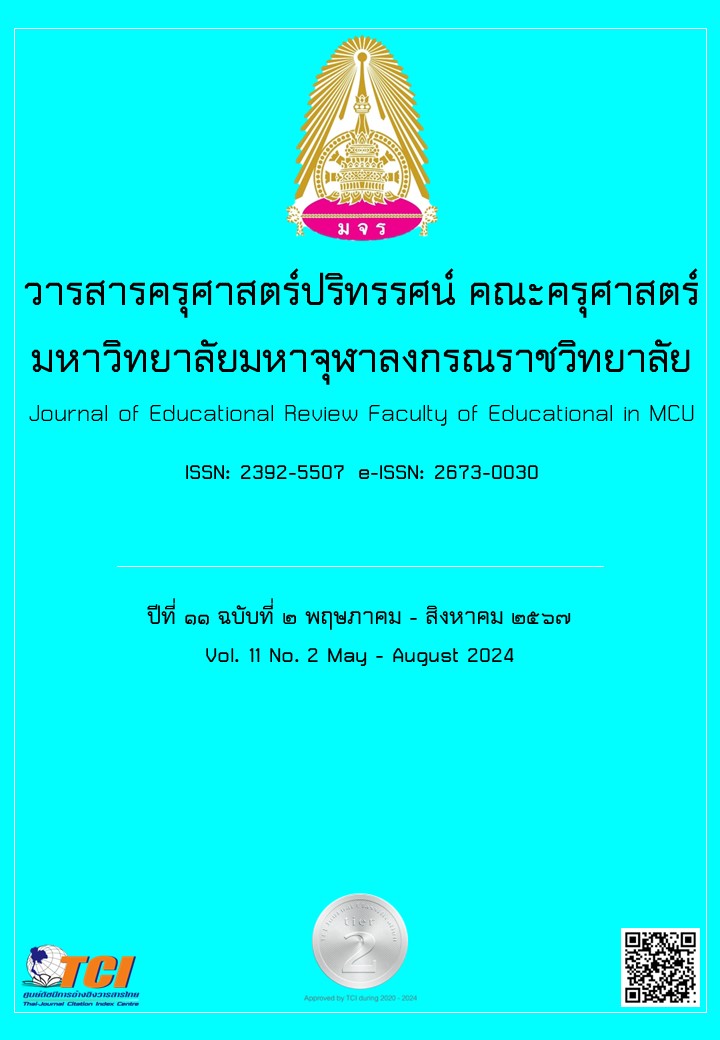PARTICIPATORY MANAGEMENT OF EDUCATIONAL INSTITUTIONS ACCORDING TO SANGHAWATTHU PRINCIPLES 4
Main Article Content
Abstract
This article presented the participatory management of educational institutions according to the principles of Saṇgahavatthu 4, which was an application of the principles of Saṇgahavatthu 4to the participatory management of educational institutions in order to provide an opportunity for people related to educational institutions, including teachers, students, parents, communities, and organizations to think, plan, decide, practice, monitor, and evaluate various activities of educational institutions together in order to brainstorm ideas. There was a participation from a variety of groups of people to create a variety of perspectives, new ideas and approaches emerge in developing educational institutions cooperation, sharing responsibility, helping work to achieve its goals, transparency, revealing information to build trust, reducing corruption problems and sustainability, the policies and activities from cooperation would receive the support and could continue sustainably. In conclusion, the application of the 4 Saṇgahavatthu principles in the participatory management of educational institutions consisted of: 1) Dna: giving, such as allocating scholarships, lunch funds, learning equipment to students in need, supporting research funds, teaching development funds for teachers, awarding scholarships to students with good academic results and good behavior. 2) Piyavca: kindly speech, that was the administrators and teachers speaking politely, gently, respectfully, listening to the opinions of students, teachers, and personnel, creating a pleasant, warm, and safe atmosphere in the educational institution. 3) Atthacariy: useful conduct, that was the administrators and teachers were honest, transparent, and verifiable. The students were honest, respecting the rules, and were responsible for themselves and society. 4) Samnattat: consistency, meant that the administrators treated students, teachers and staff with equality and fairness. Teachers gave importance to every student and promoted the potential of each student so that students could develop physically, emotionally, socially and intellectually to their full potential.
Article Details

This work is licensed under a Creative Commons Attribution-NonCommercial-NoDerivatives 4.0 International License.
ทัศนะและความคิดเห็นที่ปรากฏในบทความในวารสารฉบับนี้ถือเป็นความรับผิดชอบของผู้เขียนบทความนั้นเพียงผู้เดียว และไม่ถือเป็นทัศนะและความรับผิดชอบของกองบรรณาธิการ
กองบรรณาธิการขอสงวนสิทธิ์ในการคัดเลือกบทความลงตีพิมพ์และจะแจ้งให้เจ้าของบทความทราบหลังจากผู้ประเมินบทความตรวจอ่านบทความแล้ว
ต้นฉบับที่ได้รับการตีพิมพ์ในวารสารครุศาสตร์ปริทรรศน์ คณะครุศาสตร์ มหาวิทยาลัยมหาจุฬาลงกรณราชวิทยาลัย ถือเป็นกรรมสิทธิ์ของคณะครุศาสตร์ มหาวิทยาลัยมหาจุฬาลงกรณราชวิทยาลัย ห้ามนำข้อความทั้งหมดหรือบางส่วนไปพิมพ์ซ้ำ เว้นเสียแต่ว่าจะได้รับอนุญาตจากมหาวิทยาลัยฯ เป็นลายลักษณ์อักษร
References
กรมการศาสนา. (2542). คู่มือการบริหารและการจัดการวัดฉบับย่อ. กรุงเทพมหานคร: โรงพิมพ์การศาสนา.
คณะกรรมการปฏิรูป. (2554). แนวทางการปฏิรูปประเทศไทย: ข้อเสนอต่อพรรคการเมืองและผู้มีสิทธิเลือกตั้ง. นนทบุรี: สำนักงานปฏิรูป.
ทิพวรรณ เสนจันทร์ฒิชัย. (2553). การบริหารแบบมีส่วนร่วมโดยใช้เทคนิคจำปา 5 กลีบ. วิชาการ. 13(3). 36.
พระธรรมโกศาจารย์ (ประยูร ธมฺมจิตฺโต). (2549). พุทธวิธีการบริหาร. กรุงเทพมหานคร: มหาวิทยาลัยมหาจุฬาลงกรณราชวิทยาลัย.
พระพรหมคุณาภรณ์ (ป .อ. ปยุตฺโต). (2550). ธรรมนูญชีวิต. กรุงเทพมหานคร: พิมพ์สวย.
มหาจุฬาลงกรณราชวิทยาลัย. (2539). พระไตรปิฏกภาษาไทย ฉบับมหาจุฬาลงกรณราชวิทยาลัย. กรุงเทพมหานคร: โรงพิมพ์มหาจุฬาลงกรณราชวิทยาลัย.
สถาบันพัฒนาครู กณาจารย์และบุคลากรทางการศึกษา. (2549). การประเมินสมรรถนะครูและบุคลากรทางการศึกษาเพื่อจัดทำแผนพัฒนาตนเอง (ID - PL.AN) และแผนพัฒนาความก้าวหน้าในวิชาชีพ (CAREER PL.AN). นครปฐม : ฝ่ายวิชาการโครงการพัฒนาระบบการพัฒนาครูและบุคลากรทางการศึกษา.
สันติ บุญภิรมย์. (2552). การบริหารงานวิชาการ. กรุงเทพมหานคร: บุ๊คพอยท์.
สัมฤทธิ์ ท่าเหล็กเจริญ. (2546). ปัญหาในการปฏิบัติงานของผู้บริหารองค์การบริหารส่วนตำบล : ศึกษากรณีองค์การบริหารส่วนตำบลในเขตจังหวัดปทุมธานี. วิทยานิพนธ์ศึกษาศาสตรมหาบัณฑิต. มหาวิทยาลัยรามคำแหง.
สำนักงานคณะกรรมการการศึกษาแห่งชาติ. (2553). พระราชบัญญัติการศึกษาแห่งชาติ พ.ศ.2542. และที่แก้ไขเพิ่มเติม (ฉบับที่ 3) พ.ศ. 2553. กรุงเทพมหานคร: สำนักนายกรัฐมนตรี.
สิรภพ เหล่าลากะ. (2545). พุทธศาสตร์กับการเมือง. กรุงเทพมหานคร: สหธรรมิก.
อรศิริ เกตุศรีพงษ์. (2550). สังคหวัตถุ 4 : วัฒนธรรมองค์กรที่เอื้อต่อการจัดการความรู้. วารสาร Productivity World. 12(68). 43-46.
Anthony, William P. (1978). Participative management. Massachusetts: Addition Wesley.
Bryman, A. (1986). Leadership and Organization. London: Routedge & Kegan Paul.


